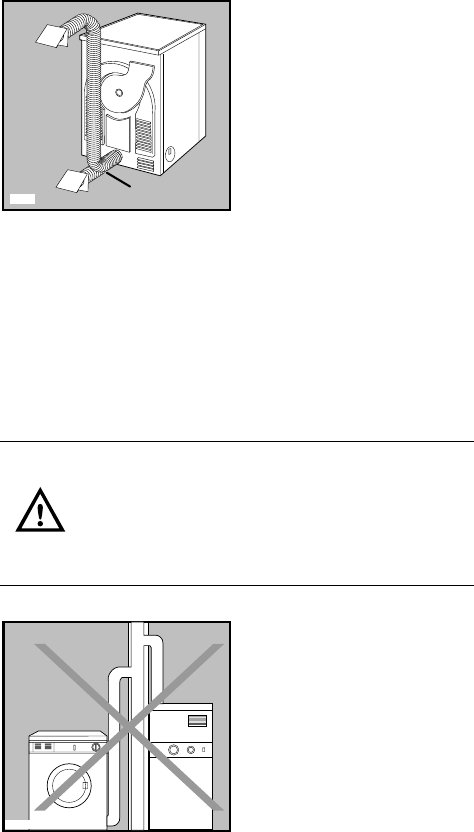
15
Advice: If the hose is long and the room temperature
low, the moisture might condense to water inside the
hose. This is an unavoidable natural phenomenon.
To prevent this water from lying in the hose or
flowing back into the tumble dryer, it is advisable to
drill a small hole (dia. 3 mm) in the lowest point of
the hose and to place a small container below it.(See
picture, point B).
Once connected to the dryer, run the vent hose to the
desired outlet point, ensuring that the run’s overall
length is less than 2.5 m, and that it contains no more
than two bends. As to the outlet itself, if you have
decided on a fixed wall/window grille, a good local
builder’s merchant should be able to supply you with
the necessary fittings and installation advice.
It is important not to connect the vent
hose to, for example, a cooker hood,
or a chimney or flue pipe designed to
carry the exhaust from a fuel burning
appliance.
Note that to avoid condensation problems, it is
essential that the dryer be fitted with the flexible hose
to carry its “exhaust” at least beyond the kitchen
units; preferable outside the kitchen.
P0055
P1056
B
In order to prevent the appliance from overheating, it
is important that the steam exhaust is unobstructed.
Therefore, in case of a permanent hose fitted to an
exterior wall or ceiling, it must have an exhaust
capacity of at least 150 m
3
/h.
If the dryer is fitted next to kitchen units, make
sure that the vent hose is not squashed. If the hose
is partially squashed, drying efficiency will be
reduced, resulting in longer drying times and
higher energy consumption.
If the hose is completely squashed, the safety cut-
outs with which the machine is fitted may operate.
125994660 TD4100W.qxd 5/21/02 2:04 PM Pagina 15 (Nero/Process Black pellicola)


















